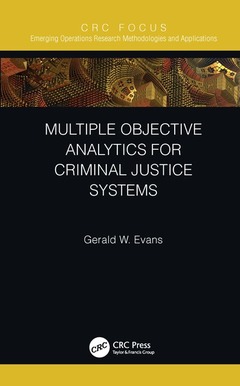Multiple Objective Analytics for Criminal Justice Systems Emerging Operations Research Methodologies and Applications Series
Auteur : Evans Gerald W.

Criminal justice systems are complex and difficult to design and operate. This is due to their many interacting parts, and their dynamic and probabilistic nature, as well as their interfaces with other systems. This book reviews the use of analytics to address issues in criminal justice system and discusses the various sources of data associated with the systems.
This book is meant to be used by those who would like 1) an introduction to criminal justice systems and 2) an illustration of how some of the various methodologies of analytics can be used to address specific issues in criminal justice systems.
This book will be of interest to faculty, students, and researchers in schools/departments of criminal justice, law, public affairs, political science, industrial engineering, and management. In addition, the book should be of use to government analysts who study the effects of criminal programs and laws.
Gerald W. Evans is Professor Emeritus in the Department of Industrial Engineering at the University of Louisville (UL). His research and teaching interests lie in the areas of multiciteria decision analysis, simulation modeling and analysis, optimization, logistics and project management.
Previous positions include Industrial Engineer for the Department of the Army, and Senior Research Engineer for General Motors Research Laboratories. He has also served as an ASEE Faculty Fellow at NASA's Langley Research Center and Kennedy Space Center.
Dr. Evans received his BS in Mathematics in 1972, his MS in Industrial Engineering in 1974, and his PhD in Industrial Engineering in 1979, all from Purdue University.
Dr. Evans has served as Principal Investigator or Co-Principal Investigator on over $5 million of funded research from organizations such as the National Science Foundation, the Defense Logistics Agency, NASA, the National Institute for Hometown Security, Louisville Metro Government, General Electric, and United Parcel Services among other organizations. In addition, he has done consulting work in the areas of simulation modeling and analysis, project management, and economic analysis for a variety of organizations.
He has published approximately 100 papers in various journals and conference proceedings. His paper: "An Overview of Techniques for Solving Multiobjective Mathematical Programs," published in 1984 was listed as one of the most cited publications in Management Science over the last 50 years (from the 2004 commemorative CD: Celebrating 50 years of Management Science, INFORMS Publication). In addition, his co-authored paper: S.J. Ellspermann, G.W. Evans, and M. Basadur, "The Impact of Training on the Formulation of Ill Structured Problems," Omega 35:2, pp. 221-236, April 2007 received the 12th Annual Citation of Excellence Award as one of the top 50 management articles out of 15,000 articles pu
Date de parution : 01-2021
13.8x21.6 cm
Thèmes de Multiple Objective Analytics for Criminal Justice Systems :
Mots-clés :
Decision Analysis; Multiple Objective; Optimization; Monte Carlo Simulation; Multiattribute Utility Function; Management Science; Clinton Crime Bill; GAO Report; Multiple objective analytics; Crack Cocaine; Juvenile crime; Geo Group; United States; Property Crime Rates; Criminal justice systems; Criminal justice reform act; MAV Function; Drug Court; Early Release Prisoners; Inform Journal; Problem Solving Courts; Pretrial Release Conditions; Problem Structuring Methods; World Justice Project Rule; Private Prisons; Fair Sentencing Act; Bail Reform; Bail Reform Act; Cop Program; Summary Reporting System; Total Crime Rate; Bail Amount; Violent Recidivism; Pretrial Conditions


